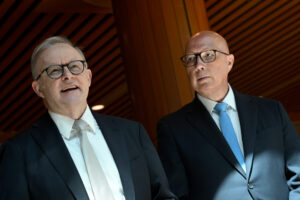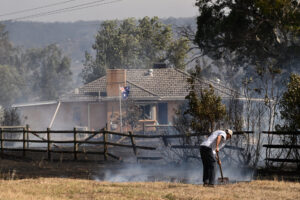
The mining industry is now surely the biggest whinger in the Australian economy.
This week it launched an all-out assault on the federal government at Minerals Week in Canberra, with chief executive of the mining industry’s chief lobby group the Minerals Council, Tania Constable, warning the government: “Undermine it at your peril.”
Relative to its size, the mining industry pays nowhere near enough tax in Australia and, perhaps unsurprisingly, they want to keep it that way. It’s obvious the mining industry is trying to cow the federal government into ruling out any policy changes before the election. It wants cuts to taxes and royalties, and IR laws that make it easier to cut wages and fire people. And it would prefer to remove any environmental restrictions preventing mining companies from polluting or opening new gas and coal mines wherever and whenever they want.
But more than that, the mining industry demands Australians all bow at its feet in gratitude. BHP wants praise for paying its taxes, insinuating the public hospital system would collapse without it, while mining billionaire Gina Rinehart asked: “Where is the red carpet for the BHPs and Rios?” As if mining companies aren’t some of the most powerful and profitable companies on the planet, let alone in this country.
Like a toxic boyfriend who wants thanks for doing the dishes (when you remind him), the mining industry demands Australians be grateful for the taxes and royalties they pay.
Australia is blessed with an abundance of resources, fossil fuels in particular. Other countries charge far more for their natural resources, while in Australia we subsidise their extraction. The reality is Australia gets nowhere near enough revenue from the fossil fuel industry and it’s time they paid their fair share. That’s what the mining industry’s assault on the government is trying to prevent.
The oil and gas industry has been described as “systemic non-payers of tax” by the Australian Taxation Office. Despite huge increases in gas production and profits, revenue from the petroleum resource rent tax (PRRT) has barely moved. No LNG projects have ever paid PRRT. In fact, the government collects more money from HECS than it does from the PRRT.
Consider that Australia is one of the biggest exporters of gas in the world, yet we charge no royalties on over half of the gas we export. None. Zero. Zip. Nothing. Australia Institute research shows in the last four years, Australians have given away gas that made $149 billion worth of LNG, for free. Around $111 billion worth of this royalty-free LNG was produced in Western Australia alone.
And how have Australians benefited from this export gas boom? They really haven’t. Domestic gas prices tripled from $3/GJ to around $10/GJ once the export terminals opened. Australia managed its gas resources so poorly, that there are now serious proposals to import gas into Australia, like Antarctica importing ice.
Opposition Leader Peter Dutton was only too happy to pledge fealty to the mining industry, promising “a Dutton Coalition government will be the best friend that the mining and resources sector in Australia will ever have”. But other Australian political leaders have chosen to put the interests of Australians above the profits of the mining industry.
In Dutton’s home state of Queensland, when Russia’s invasion of Ukraine sent commodity prices soaring in 2022, the state Labor government changed its royalty scheme so a greater portion of the windfall was paid to the community. This money, that would otherwise have gone to multinational shareholders, is mainly being spent on better public services for Queenslanders.
When Queensland introduced the changes, the mining industry issued dire warnings about “sovereign risk”, investment drying up and damage to the viability of the coal industry – it was complete rubbish. Investment in Queensland increased after the policy change.
In the face of threats from the Queensland Resources Council, Queensland Premier Steven Miles politely reminded the QRC: “At the end of the day, we own that coal and we sell that to them, and it cannot be dug up twice.
“And no matter how many ads the Queensland Resources Council runs attacking me, we will continue to stand by our policy.”
All our political leaders could learn a lesson from Steven Miles. The fact is Australians collectively own all the coal, gas, iron ore and mineral deposits across the country. Royalties are the price mining companies pay to mine and sell those resources. But Ms Constable described Queensland’s royalty changes as “a huge impost on the industry”. That’s like a bricklayer demanding all his bricks for free.
The mining industry has built up this myth over decades the Australian economy is dependent on mining, but it’s all spin, lies and bull. Mining is a small employer compared to basically any other industry. Like all other industries, it generates revenue for governments, but most of the benefits go to its foreign shareholders.
The mining industry wants you to think it alone pays for teachers and hospitals, when the reality is we all do. In Australia, BHP pays less tax than teachers do. Teachers pay more tax than BHP and they educate the entire Australian workforce, yet you don’t hear teachers bang on about being the backbone of the economy.
If Australia really did rely on the low-employing, tax-avoiding, high-polluting, and largely foreign-owned mining industry for its economic security, we would be in serious trouble.
Governments that bow to the demands of the mining industry will deliver a poorer Australia.
What’s in the best interest of the mining industry profits is not necessarily what’s in the best interest of Australia, or Australians, and we need political leaders that understand the difference.
Between the Lines Newsletter
The biggest stories and the best analysis from the team at the Australia Institute, delivered to your inbox every fortnight.
You might also like
Why a fossil fuel-free COP could put Australia’s bid over the edge
When the medical world hosts a conference on quitting smoking, they don’t invite Phillip Morris, or British American Tobacco along to help “be part of the solution”.
5 ways and 63 billion reasons to improve Australia’s tax system
With a federal election just around the corner, new analysis from The Australia Institute reveals 63 billion reasons why our next Parliament should improve the nation’s tax system.
Burning homes and rising premiums: why fossil fuel companies must pay the bill
Another summer, another round of devastation: homes lost, communities evacuated, lives upended.


